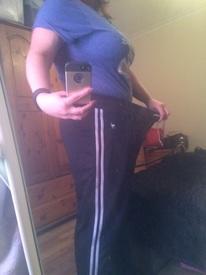Sleeping like a caveman...

ProCoffeenator
Posts: 523 Member
So since I hit ketosis I've been having nights were like clockwork 2 am hits and I wake up. Usually I can go back to sleep other nights I wake up and have to move. Bathroom, go get fresh air etc.
Anyone else experiencing this on Keto? I've been trying to find some info online but so far no actual science but I've come across a few articles stating its a preprogrammed human trait to wake up to make sure your camp isn't being stalked by tigers and such!
Curiosity kills the cat!....
Anyone else experiencing this on Keto? I've been trying to find some info online but so far no actual science but I've come across a few articles stating its a preprogrammed human trait to wake up to make sure your camp isn't being stalked by tigers and such!
Curiosity kills the cat!....
0
Replies
-
Lol! I haven't read that article but yes I also experience this. I make sure to not drink caffeine after 2pm. And also, take mag supplement just before bed. That seems to help a bit.0
-
Well.... we're there any tigers?

I've heard different things about it. Some people just find they need less sleep. Some people are waking up because of needing to go through the bathroom more often in the beginning. But mostly it seems like I hear there has been no change in sleep or that sleep is improved in some way. I had no effect that I could ever tell.0 -
I'm low carb, not necessarily keto and I was having this problem, but I started taking a topical magnesium right before bed and now I rarely wake up and can always go immediately back to sleep.0
-
I've named it the 2AM wake-up call. The call has been with me most of my adult life. I had a doctor once that told it was not normal and I needed sleeping pills, which were declined. Since then I read somewhere on the internet that it is normal for many people, that some people actually get out of bed to do things, and when they go back to bed it is called second sleep.1
-
I've named it the 2AM wake-up call. The call has been with me most of my adult life. I had a doctor once that told it was not normal and I needed sleeping pills, which were declined. Since then I read somewhere on the internet that it is normal for many people, that some people actually get out of bed to do things, and when they go back to bed it is called second sleep.
Oh yeah this happens to me too sometimes. I'd get up to go to the bathroom, and when I go to bed again, I can't fall asleep. Then I get up and go play video games for a few hours.
And then I get sleepy again (generally 2-3 hours before my alarm goes off) and go back to bed.0 -
I'm actually sleeping better. I used to have insomnia either from stress or hormones and be up from 2 or 3 on. I am sleeping so solidly now and if I wake up I can go back to sleep.1
-
At first, I was having the issue of getting up because I had to pee, but after a couple weeks, I started sleeping sounder than I ever have. My wife has commented about how I don't even move which is confirmed by what my Fitbit shows for my sleep.

5 -
I'm sleeping way better than I ever did now that I'm keto. I used to be up 2-3 nights a week watching late night tv because I couldn't sleep. Now I'm out way before midnight and eyes are closing before I ever hit the bed some nights.
It's crazy because I've fought with insomnia my entire life and can't even tell you the medications I've taken over the years for it. Had I known I just had to stop eating bread? Crimeny...3 -
Both me and my husband both wake up in the middle of the night for a bathroom break. Most likely it's because we are drinking a lot of fluids before bedtime, him with pop and me with tea. Between tea, coffee, and water I have to take quite a few breaks in the day.0
-
This is me! Clockwork! 2am. I'm awake anywhere from 1/2 hour to the rest of the night. I take a magnesium supplement before bed, have tried sleepy time tea, alcohol, etc. The good thing is that I'm not really tired during the day like I'd expect to be. I've been getting up and doing stuff just cuz it seems like such a waste laying there in bed watching the clock tick by. I've come to the realization that maybe I don't need all that sleep afterall and at least I'm still resting.0
-
http://www.livescience.com/12891-natural-sleep.html
http://slumberwise.com/science/your-ancestors-didnt-sleep-like-you/
Waking up in the middle of the night was considered normal for our ancestors! I know if I get up for some reason and go back to bed I sleep much better on my 2nd sleep! 1
1 -
http://www.livescience.com/12891-natural-sleep.html
http://slumberwise.com/science/your-ancestors-didnt-sleep-like-you/
Waking up in the middle of the night was considered normal for our ancestors! I know if I get up for some reason and go back to bed I sleep much better on my 2nd sleep!
I sleep deeper on my 2nd sleep. But then I'm always sad when my alarm goes off and I need to get up. 0
0 -
I get a 1am wake up call. But mine's menopause.
 1
1 -
Sabine_Stroehm wrote: »I get a 1am wake up call. But mine's menopause.

Yup, those hot flashes wake me up in the wee hours of the morning every single day! I was hoping LCHF might help, but no luck so far.0 -
Yep, happens to me all the time too but I blame menopause, not keto. I'm hot, then I'm cold, then I'm hot, then I'm cold...blargh!2
-
I've been waking up at 2 a.m. since last March, when a six day hospital stay completely destroyed my old sleep patterns. For a while I was able to read a little then get my second sleep. Now we have two six month old kittens who regard 2 a.m. as prime time and are outraged if I wake up only to abandon them. The pitiful cries from the other side of the bedroom door are too heartbreaking to ignore. "Buuut we taut we wuz going ta plaaaaaaay."4
-
Just the opposite. I'd wake up when my meals consisted of a normal or higher amount of carbs. It was probably from blood sugar crashing. But on LCHF, my blood sugar is more stable, I sleep through the night, and I struggle to wake up. Good luck!ProCoffeenator wrote: »So since I hit ketosis I've been having nights were like clockwork 2 am hits and I wake up. Usually I can go back to sleep other nights I wake up and have to move. Bathroom, go get fresh air etc.
Anyone else experiencing this on Keto? I've been trying to find some info online but so far no actual science but I've come across a few articles stating its a preprogrammed human trait to wake up to make sure your camp isn't being stalked by tigers and such!
Curiosity kills the cat!....0 -
I am constantly waking up between 2am-3am, never thought about it as a cave man thing, I thought it was just down to my sleeping issues. I am well known to be a terrible sleeper at the best of times at the moment. But yes, like clock work, I wake up pretty much every night.1
-
I think it's mostly hormones, ladies -- which in my case means staggeringly low cortisol, high progesterone, staggeringly low estrogens, and a slightly off-kilter thyroid level. My sleep is often appallingly bad, so much so that I have to stop driving sometimes.
A lot of the time night-time awakenings are due to inappropriate cortisol levels. If your cortisol is high at 2 a.m., you'll wake up.
0 -
For me it's staggeringly low PROGESTERONE. My ratios are absurd. Even with supplementation.I think it's mostly hormones, ladies -- which in my case means staggeringly low cortisol, high progesterone, staggeringly low estrogens, and a slightly off-kilter thyroid level. My sleep is often appallingly bad, so much so that I have to stop driving sometimes.
A lot of the time night-time awakenings are due to inappropriate cortisol levels. If your cortisol is high at 2 a.m., you'll wake up.0 -
Sabine_Stroehm wrote: »
For me it's staggeringly low PROGESTERONE. My ratios are absurd. Even with supplementation.I think it's mostly hormones, ladies -- which in my case means staggeringly low cortisol, high progesterone, staggeringly low estrogens, and a slightly off-kilter thyroid level. My sleep is often appallingly bad, so much so that I have to stop driving sometimes.
A lot of the time night-time awakenings are due to inappropriate cortisol levels. If your cortisol is high at 2 a.m., you'll wake up.
About 18 months ago my progesterone was staggeringly low. With supplementation of 300 mg compounded oral caps nightly my sleep improved almost overnight for the first time in years, but after a year or so it got too high, so now I'm lowering it to 200 mg nightly and adding the estrogens.
The cortisol is harder to deal with. I'll be using a medical-grade Withania complex. Yer basic Ashwaghanda 3 x a day is good, but this stuff is better, apparently. I also use Holy Basil caps at night, which I find helps with the early-morning wakeups. My guess is it will take me a year to get the cortisol sorted out.
Hopefully the the progesterone and estrogen will find a good balance soon and my sleep will improve again. I can handle almost anything if I've had a good sleep, and I can handle almost nothing if I have bad insomnia.
0 -
Sabine_Stroehm wrote: »
For me it's staggeringly low PROGESTERONE. My ratios are absurd. Even with supplementation.I think it's mostly hormones, ladies -- which in my case means staggeringly low cortisol, high progesterone, staggeringly low estrogens, and a slightly off-kilter thyroid level. My sleep is often appallingly bad, so much so that I have to stop driving sometimes.
A lot of the time night-time awakenings are due to inappropriate cortisol levels. If your cortisol is high at 2 a.m., you'll wake up.
About 18 months ago my progesterone was staggeringly low. With supplementation of 300 mg compounded oral caps nightly my sleep improved almost overnight for the first time in years, but after a year or so it got too high, so now I'm lowering it to 200 mg nightly and adding the estrogens.
The cortisol is harder to deal with. I'll be using a medical-grade Withania complex. Yer basic Ashwaghanda 3 x a day is good, but this stuff is better, apparently. I also use Holy Basil caps at night, which I find helps with the early-morning wakeups. My guess is it will take me a year to get the cortisol sorted out.
Hopefully the the progesterone and estrogen will find a good balance soon and my sleep will improve again. I can handle almost anything if I've had a good sleep, and I can handle almost nothing if I have bad insomnia.
I'm using the transdermal, about 50Mg a night. And magnesium, and sometimes a prescription antihistamine when I miss a few nights of sleep.
My estrogens are still pretty good. But I'm way estrogen dominant. That's my challenge.
I use Vitex and "women essential" oils (Omegas etc.). The combination of the above does help. I have good days and bad days, but yeah, when I lose a couple of nights sleep, I can't handle much!0 -
Sabine_Stroehm wrote: »
I'm using the transdermal, about 50Mg a night. And magnesium, and sometimes a prescription antihistamine when I miss a few nights of sleep.
My estrogens are still pretty good. But I'm way estrogen dominant. That's my challenge.
I use Vitex and "women essential" oils (Omegas etc.). The combination of the above does help. I have good days and bad days, but yeah, when I lose a couple of nights sleep, I can't handle much!
50 mg progesterone is a pretty low dose. Also, oral progesterone helps with sleep. It really does.
0 -
I saw that someone mentioned high cortisol. My ND told me that night time waking was due weak adrenals that are unable to produce enough cortisol to keep blood sugar from dropping too low. So instead the adrenals pump out adrenaline, which produces that jolt. Mine used to kick in about four or five hours after going to bed. But now on keto and taking an Isocortex supplement, I no longer wake up that early.0
-
I started keto in November. I've had this problem both last spring and again now since August. It sucks.
 0
0 -
I saw that someone mentioned high cortisol. My ND told me that night time waking was due weak adrenals that are unable to produce enough cortisol to keep blood sugar from dropping too low. So instead the adrenals pump out adrenaline, which produces that jolt. Mine used to kick in about four or five hours after going to bed. But now on keto and taking an Isocortex supplement, I no longer wake up that early.
Interesting!
I need to keep pursuing this. I've talked to both a pcp and my MS specialist about this but haven't gotten anything that helps yet. I take two melatonin and two Benadryl every night. I fall asleep well but wake up any time between 12 (bad nights!) and 4, often around 2. I have some good nights but a lot of rough nights, too.0 -
weak adrenals can be fed licorice root - it will give them the nutrition they need to function properly0
-
I saw that someone mentioned high cortisol. My ND told me that night time waking was due weak adrenals that are unable to produce enough cortisol to keep blood sugar from dropping too low. So instead the adrenals pump out adrenaline, which produces that jolt. Mine used to kick in about four or five hours after going to bed. But now on keto and taking an Isocortex supplement, I no longer wake up that early.
That's an interesting theory. It makes a certain amount of sense.
I wonder if those that have the issue would compare similarities like
Insulin resistant? (Including PCOS, Diabetes, history of past hypos or Pre-Diabetes etc...)
Carb level of your evening meal/snacks?
I wonder if the majority of those that do experience it may be having dropping blood sugar, even if it's not actually going low. Maybe it's just dropping 10 points suddenly from a surge of insulin due to the IR.
This idea still makes sense as you consider that many say that it gets better over time, since we would expect insulin production to reduce in time as low carb is followed consistently.
The cortisol aspect also makes sense since we know that comes with increased glucagon secretion that could fire up the over production of insulin and reignite the IR or slow down the reversal of it in the beginning.
Assuming that's what is happening, it seems the only action plan is to stick to the plan and keep working on the IR. Maybe even incorporating things to specifically address IR like fasting or herbs/supplements as mentioned that may be of benefit. I think Apple Cider Vinegar (ACV) is also thought to help. Probably due to its probiotics so it would have to be the kind with "mother".
Interesting theory though. Makes sense to me.0 -
Sabine_Stroehm wrote: »
I'm using the transdermal, about 50Mg a night. And magnesium, and sometimes a prescription antihistamine when I miss a few nights of sleep.
My estrogens are still pretty good. But I'm way estrogen dominant. That's my challenge.
I use Vitex and "women essential" oils (Omegas etc.). The combination of the above does help. I have good days and bad days, but yeah, when I lose a couple of nights sleep, I can't handle much!
50 mg progesterone is a pretty low dose. Also, oral progesterone helps with sleep. It really does.
50Mg, if you were taking a capsule (which is mostly metabolized by the liver), is a small does. 50MG transdermal is more than the body produces at it's highest point in a menstrual cycle.
The estimate is that 60-80% of oral progesterone is broken down by the liver. When 100MG oral is prescribed 20-40 gets to the body.
I tried oral. Twice. It gave me Gerd, and didn't give me the same "ahh, sleep" as transdermal.
I am sleeping much better. I still have too much estrogen, and have some cortisol issues, but the 50MG of transdermal prescription progesterone has greatly improved my sleep.0 -
I saw that someone mentioned high cortisol. My ND told me that night time waking was due weak adrenals that are unable to produce enough cortisol to keep blood sugar from dropping too low. So instead the adrenals pump out adrenaline, which produces that jolt. Mine used to kick in about four or five hours after going to bed. But now on keto and taking an Isocortex supplement, I no longer wake up that early.
This is me right now. Unfortunately, here in Canada doctors don't even talk about Isocortex, so we have to struggle with things like Ashwaghanda.
0
This discussion has been closed.














